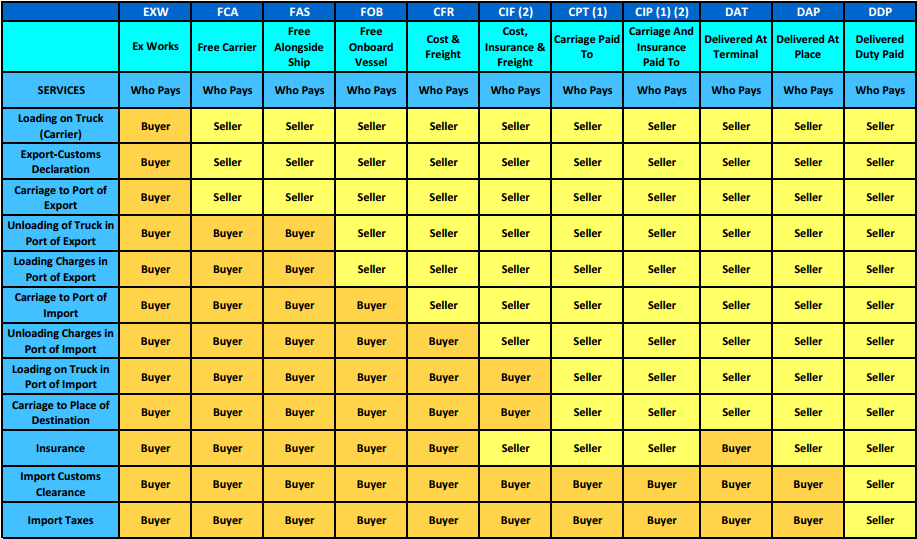Incoterms play an important role in China’s exports and imports. It is the result of the long-term practice and gradually forms unified rules that define the obligation of two parties between buyers and sellers for the delivery of commodities under sales agreements. Be sure to specify a local freight forwarder in China whose rich experience in the freight forwarding industry can help you with shipping management.
This latest version, made in 2010, involves costs and risks often unforeseeably huge.

The above incoterms can be divided into two groups. One of the groups for any mode of transportation includes EXW, FCA, CPT, CIP, DAP, and DDP. Other incoterms are considered only suitable for sea freight and inland freight: FAS, FOB, CFR, and CIF.
Group E (EXW) – This is the minimum obligation for the seller. The buyer picks up the cargo from the seller at the named place.
F Group (FAS, FCA, FOB) – The seller delivers to the carrier assigned by the buyer.
C Group(CFR, CIF, CPT, CIP) – The seller arranges the shipping method but doesn’t bear the risk of being damaged after loading.
D Group(DAT, DAP, DDP) – The seller is responsible for the maximum obligation, including the risk and cost during the transportation.
5 Common Incoterms
EXW – Ex Works
The delivery is accomplished when the buyer picks up the goods from the seller at the named place (warehouse, storage or factory etc.), the seller doesn’t clear the customs for export. Buyer controls freight from door to door. The contractual shipper on the waybill should be the buyer.
The buyer will designate one freight forwarder to arrange to pick up the shipment from the named place and undertake booking, customs declaration, inspection, and delivery to the destination. And the relevant expenses should be at the buyer’s cost.
FOB – Free on Board
The seller’s delivery is completed when the goods are across the ship’s rail. The buyer controls ocean freight routing. Fob terms require that the seller also clears the goods for export. Generally, this is the term most often used in importing from China.
The buyer will designate one freight forwarder to arrange the transportation after the shipment is loaded on board the ship and undertake booking, customs clearance, inspection, and delivery to the destination. And the relevant expenses should be at the buyer’s cost.
CFR – Cost and Freight (named port of destination)
The seller’s delivery is completed when the goods are at the port of destination across the ship’s rail. The seller has to pay for the shipment’s delivery to the destination port and declaration the customs for export.
The seller will designate one freight forwarder to arrange a trailer for transportation and undertake booking, customs declaration, inspection, and delivery to the destination. And the seller burdens the relevant expenses.
CIF – Cost, Insurance and Freight (named port of destination)
This term is the same as CFR terms, except the seller agrees to purchase marine insurance in the buyer’s interest.
DDP – Delivered Duty Paid
The seller takes responsibility for carriage, delivery of the goods at the named place, and customs clearance. And the seller should pay for the tariff and other fees.
Whether you are a buyer or a seller, you take responsibility for choosing a freight forwarder, the shipping route, and the date. The control of cost is a key factor to the best incoterms. For most companies and individuals, how do you think of these terms? Those terms that can reduce costs and risks for you are the appropriate terms.

